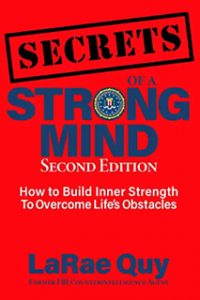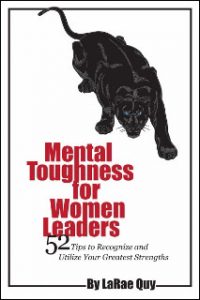Several years ago I faced a health scare that forced me to take a different look at how to get through challenges and setbacks.
I was on a treadmill for my annual physical and the attending physician suddenly shouted for me to stop—immediately. He said the test was showing I had ischemia. It’s a condition wherein the heart does not get enough oxygen and stops beating. It can be fatal!
The FBI sent me to a heart specialist and prohibited me from participating in firearms or any activity that involved physical exertion. The ischemia scare was a life-changing event for me; it’s the primary reason healthy athletes drop dead.
It was a terrible time in my life. I suffered a long period of high-magnitude stress. In the months that followed, it was determined that my heart gulps for oxygen, corrects itself, and recovers quickly. While my physical condition was eventually diagnosed as excellent, I had suffered my first health crisis. At the time, it seemed I’d never recover or receive a good health diagnosis.
As it turns out, this terrible time was good training for a COVID pandemic, political and social upheaval, and financial uncertainty. My experience taught me that while I never know what can happen next, I know how to cope with life’s unexpected challenges and keep going, even when it’s hard. Especially when it’s hard.
We enter into a dark period and descend to the depths. We fight the urge to quit and claw our way through. We find something on the other side, a part of ourselves we’d never met before. What emerges is a better person who grew from the fight of the challenge.
A challenge is amplified when we don’t see it coming, when we don’t have any control over it, and when it’s something we’ve never had to deal with before. The way we navigate a challenge or traumatic event depends, in part, on our resilience. Resilience is our ability to recover from setbacks, obstacles, and challenges. It’s our ability to adapt to new circumstances, to move forward, and sometimes experience growth.
To better understand how to get through challenges, I turned to research conducted by the U.S. Army on Post Trauma Stress Disorder (PTSD). We all deal with stress, trauma, and crises in different ways. Our resilience quotient is the result of genetics, environment, and personality factors. So far, research has found that genetics is the smallest part.
When faced with a traumatic event, most people react with symptoms of depression and anxiety. But within a month or so they are physically and psychologically back to where they were before the trauma. They accept responsibility for their actions, forget about blaming others, and move. That is resilience.
The study found that some have a tougher time and may need counseling and medication to get through. There are a few individuals, however, who actually have post-traumatic growth. They, too, first experience depression and anxiety, but within a year they are actually better off than they were before the trauma, crisis, or challenge.
These were the people I needed to learn from, and so do you if you hope to overcome unexpected adversity and challenges:
1. Start At A Young Age
It’s not true that some of us are born more resilient than others. Psychiatrist Bessel van Der Kolk’s research has found that your childhood experiences are a great predictor of how you manage all kinds of difficult situations later in life.
It’s important for us to experience different traumas at different ages because these early experiences sculpt our brains. The reason? The brain is a use-dependent organ. Continual problem-solving throughout our life enables the brain to grow. This is important because neurons not used tend to atrophy. Resilience is a set of skills that can be learned and part of the skill-building comes from exposure to very difficult, but manageable, experiences as a child.
How To Make It Work For You: Since no one is born resilient, each child will continue to grow the traits that are nurtured by their parents. Wimps had parents that protected them from the hard knocks called life. While it’s hard to see a beloved child struggle with things that hurt, these experiences produce potent opportunities for improving resilience skill sets.
2. Think About Your Challenge In A Different Way
Soldiers who experienced a crisis or trauma were able to reframe the trauma in such a way that they could extract meaning from it. Although they are able to reinterpret their situation, it is not blind optimism or disingenuous positive thinking that creates the change. The suffering is real. The difference is that they use positivity as a mental framework to turn their suffering into achievement and self-improvement.
Not everything that’s hard is good, but almost everything good is hard.
We need to face our adversity and challenges before we can determine how we’ll get through them. The good news is that most of us will, according to Professor George Bonanno. Bonanno’s lab looked at 67 studies on various types of traumatic events. He found that two-thirds were resilient and able to function very well in a short period of time.
How To Make It Work For You: Post-traumatic growth does not mean you will be free of the memories of grief. If you try to put your life back together and pretend that nothing has happened, you’ll remain fractured and vulnerable. But if you accept the breakage, you can cultivate growth within yourself, become more resilient, and open to new ways of living.
3. Accept That You Are Not Your Own God
I know, I know! This will come as a serious shock to some of you because there are a fair number of folks out there who really do think they rule the world. If others think you’re a God, that’s OK. If you think you are, that makes you a jerk.
Resilient people who can move through adversity and obstacles recognize a higher authority than themselves. They have a religious or spiritual belief system that gives them a moral compass.
Research confirms that a worthy cause or a belief in something greater than oneself produces both resilience and flexible thinking. Resilient people carefully accept what they can’t change about a situation and focus on what they can change. This boosts their ability to cope.
How To Make It Work For You: Look for opportunities that exist even in darkest times. In times of isolation, start a meditation or prayer practice, take online courses, or develop a hobby. Tether your life to a mission, a meaning, a purpose. When you are committed to something of value and meaning, it gives you courage and strength.
4. Develop Deeper Relationships
People who overcome unexpected adversity and challenges have a strong social support system. You cannot be resilient and “go it alone.”
People who experience post-traumatic growth are able to do so only when they deepen their relationships with others. Their depth and appreciation for those relationships are extraordinary.
How To Make It Work For You: Soldier Fitness programs have identified these key areas as essential for resilience and post-traumatic growth:
- Re-connect with families, relatives, friends, co-workers, and neighbors. Positive growth from trauma is nurtured by supportive relationships.
- Volunteer in whatever capacity, to ease the pain and suffering of the general population. The benefit we receive when helping others is as great as the feelings of wellbeing from those we help.
- Ask for help from other people when everything seems insurmountable. This is the time to let go of a “go it alone” attitude.
- Turn to faith as a source of solace and comfort. Numerous studies have discovered that religious and spiritual activities can moderate depression and stress.
© 2020 LaRaeQuy. All rights reserved.
You can follow me on Twitter, Facebook, Instagram, AND LinkedIn
Are you mentally tough? Here is my FREE Mental Toughness Assessment
Check out my new online training program at www.SecretsOfAStrongMind.com
Get my new book, “Secrets of a Strong Mind (second edition): How To Build Inner Strength To Overcome Life’s Obstacles”
Author of “Mental Toughness for Women Leaders: 52 Tips To Recognize and Utilize Your Greatest Strengths”






Hi LaRae,
I really enjoy your content. Not that your points are in order of importance, but I like that number 1 is Start from a young age. So important for us to cultivate and nurture toughness, perseverance, and resilience in our youth. Looking forward to the next post.
Thanks
Don
Hi Don
No, the points aren’t in order of importance although it makes sense to start at a young age! When we trace back the elements that made us resilient in the face of adversity, it usually starts with how we overcame obstacles as a child. It’s vitally important that children learn these critical coping skills as they occur rather than expecting an adult to “make it all better.”
Hi LaRae,
I was reading something by Naval Ravikant recently and it basically says we need to retrain our brains to ask what is the positive of this difficulty or challenge. And if we can ask this question immediately, we are on the way towards an outlook that sees every challenge as an opportunity. I thought of this when reading your post and once again, great message, LaRae!
Hi David…sorry for the delay in responding! I need to read Naval Ravikant because I agree with him wholeheartedly! Take care…
As usual, where do I start LaRae Quy. You’ve shared a variety of invaluable info I, personally would never have known. Plus I love that you always back-up your shares with solid info we can also learn from.
We can all learn from Section 2 – Think about your challenge in a different way –
“Soldiers who experienced a crisis or trauma were able to reframe the trauma in such a way that they could extract meaning from it. Although they are able to reinterpret their situation, it is not blind optimism or disingenuous positive thinking that creates the change. The suffering is real. The difference is that they use positivity as a mental framework to turn their suffering into achievement and self-improvement”. We can all use this as a guideline in our own lives. Simply being positive isn’t enough.
I just saw this Jean…I love examples of how people acknowledge the pain (because it’s real) but choose to move on anyway. They are the true heroes!